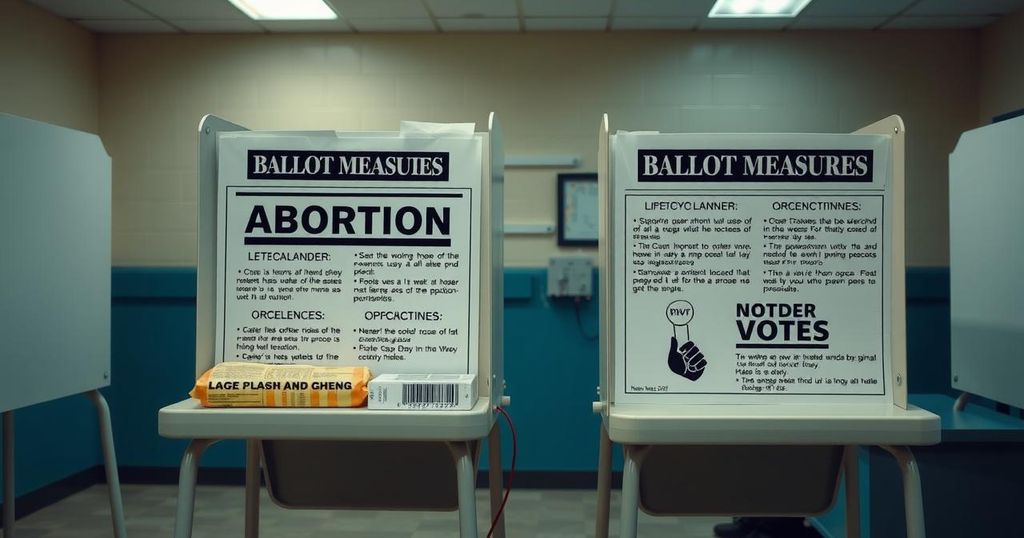Voter Measures and the Specter of Election Litigation: A Complicated November Ahead

Voters are facing competing measures on abortion and elections in the upcoming November 5 election. Former President Trump seeks a decisive victory to prevent fraudulent claims, as both Republicans and Democrats anticipate a drawn-out battle over election results. Numerous lawsuits are underway, primarily targeting mail-in ballots and voter eligibility, raising concerns about election integrity amid heightened litigation and potential delays in certifying results.
As voters approach the November 5 election, they are confronted with competing ballot measures concerning abortion and elections, raising the question of what will happen if both measures are approved. Former President Donald Trump, the Republican presidential nominee, aims for a decisive victory and has voiced concerns over potential manipulations of the election results, indicating a desire for a “landslide” win to prevent any claims of fraud. Despite Trump’s insistence, the Republican and Democratic parties are bracing for a prolonged dispute over the election outcomes. Numerous lawsuits have already been initiated, predominantly by Republican affiliates, addressing various election procedures including mail-in ballots, those from overseas voters, and allegations concerning non-citizen voting. Significantly, Trump’s refusal to acknowledge his previous electoral loss continues to sow doubt, and comparable sentiments are echoed by many within the Republican party. Democrats warn that individuals aligned with the election denial movement, now strategically positioned in key electoral roles, might reject legitimate results, potentially initiating more legal challenges. Michael Waldman of the Brennan Center for Justice articulated, “In 2020, the election deniers were improvisational… Now that same election denialist impulse is far more organized.” The escalation in election litigation—nearly tripling since the Supreme Court’s decisive involvement in the 2000 election—has become more pronounced with new financial dynamics allowing entities to fund legal battles, not solely as a vehicle for winning cases, but also as a means of political messaging. It is anticipated that around 180 cases related to voting and election integrity have been filed this cycle. The increase in contentious election litigation is coupled with concerns regarding recent reforms targeting certification procedures, with potential delays and disputes on the horizon. Should judicial challenges arise, particularly post-election, there are concerns that such efforts could exacerbate existing political tensions and contribute to a chaotic electoral environment. For instance, in Georgia, a judge recently ruled against newly established election rules, prompting an appeal from the Republican National Committee, evidencing the charged atmosphere surrounding the election process. The ramifications of these ballot measures, alongside ongoing litigations, underscore an increasingly polarized electoral landscape, emphasizing potential complexities voters may face in the aftermath of the elections.
The electoral landscape leading into the 2024 presidential election is highly contentious, marked by significant legal battles and disputes over voting practices. Former President Donald Trump’s persistent claims of election fraud from the 2020 election continue to resonate within the Republican party, driving both public rhetoric and legal strategies. The evolution of election-related lawsuits has notably accelerated since 2000, with unprecedented levels of funding and participation from outside organizations intended to influence electoral processes. As new ballot measures emerge—particularly concerning the divisive issues of abortion and election integrity—voters are placed in a complicated position, especially if both measures pass amidst ongoing legal challenges and political assertions.
In summary, the upcoming election is marred by competing ballot measures and a backdrop of heightened legal scrutiny surrounding electoral integrity. As both parties prepare for battles over outcomes and certification, the actions of various candidates and affiliated groups will significantly shape the post-election narrative. The intricate interplay of litigation and political maneuvering could impact voter confidence and the overall democratic process.
Original Source: apnews.com







